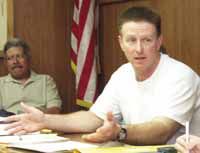| Councilman Bob Welch discusses an agenda item with Helper residents attending the city’s regularly scheduled meeting last Thursday evening. |
Helper officials met last Thursday and heard from a citizen concerned about the city council’s recent decision to allow dogs on the river parkway.
“Why did you let dogs back on the parkway?” asked Ronald Mutz. “I know I will not walk on it again until the dogs are gone. People are not cleaning up after their animals.”
In March, the council members voted to allow dogs to be walked on a leash on the parkway for a 90-day trial period.
Helper bans dogs from the city’s parks. But proponents said the path along the river was more like a city street, where it is legal to walk dogs, than it was a park.
The ban that was placed on the parkway in 1999 had been adopted by a prior administration because of complaints about owners not cleaning up after the animals and also because of the problem with vicious dogs.
Mutz brought the matter up at the April 25 council meeting.
“Some dogs are vicious and they shouldn’t be out on the parkway,” explained Mutz. “I was out there one day and, if the owner of one animal had not had the leash on it, I would have got bitten. I can promise you that if I am down there and get bit, both the owner and the dog will end up in the river and I will sue Helper city.”
Councilman Tony Gonzales responded to Mutz’s comments.
“As long as dogs are on a leash, they can walk them on any city street,” pointed out Gonzales. “Owners are liable for what their dogs do – not the city.”
Mutz brought up the point that someone was bitten by a dog on a leash a couple of years ago.
“Dogs should be kept in yards and should not be on the streets at all even on a leash,” declared the Helper resident. “If the owners want to run them they should go up in the mountains. And they certainly shouldn’t be on the parkway.”
Discussion ensued with city employees about what they had witnessed on the parkway.
“When we had that meeting, no one objected to having this trial period to see if it would work,” explained Mayor Joe Bonacci. “The people who wanted to have dogs there have been patrolling it and our staff is observing what is going on to see if there are any problems.”
None of the city employees or council members reported observing any problems or having registered complaints from anyone else, with one exception.
The exception involved a problem with one citizen letting a dog in the sandbox area.
Helper Police Chief George Zamantakis issued the person in question a citation for the violation.
City attorney Gene Strate addressed the matter of Helper’s potential liability. Strate told the council that liability for dog bites is pretty much determined on a case by case basis. But cities are generally not held liable for the incidents.
The council agreed that the trial period would continue and the situation would then be evaluated.
In a website poll conducted by the Sun Advocate after the initial decision, 38 percent of the respondents supported the change and wanted it to be permanent. Thirty-two percent favored the test period, but wanted the results of the 90-day trial before supporting a permanent change. Twenty-three percent wanted the ban to continue and 8 percent had no opinion on the matter.
Acting on unrelated agenda items, the Helper council members:
•Honored the volunteers who assist with city projects.
First, the mayor honored the individuals who have helped with the museum, some of whom have been there almost 20 years.
Bonacci also honored citizens who have worked to secure funds for the Rio Theatre and the men who have helped at Gardner baseball field.
•Officials approved the purchase of a new fire hydrant to replace a broken one on 10th North for the cost of $926.
•Officials discussed what constitutes the type of organization the city should waive fees for when using such facilities as park venues and the civic auditorium.
Specifically, the city waived the fees for an upcoming blood drive , for a school group to use one of the pavilions on the parkway for lunch and the Carbon County Democratic Convention.
The officials left future fee waivers up to Councilman Kirk Mascaro, unless he feels they need to hear about it before hand.
•The council set limits on all credit cards that will be issued to city department heads.
The issuance will eliminate the cards the city has been using for various individual retailers around Carbon County.
•The city has decided to do a lease/option to purchase on a street sweeper.
The cost of the refurbished machine will be $65,000, with payments spread over the next six years.
The machine will not be paid for out of the general city coffers. The lease/financing of the machine is going to be bid out to local institutions if possible.
Following the regular agenda, Councilman Gonzales reported that the poles for the repair of a bridge had been delivered.
The poles for the bridge repair project were donated by Plateau Mining-Willow Creek. Utah Power & Light moved the poles for the city.
In addition, Gonzales reported that the repair projects around town on road repaving and curb and gutter will begin soon. He also indicated the playground equipment at the park is being removed because of the potential liability to the city.
“I hope we can soon find some funding to replace that equipment with safer equipment,” explained Gonzales.
Chief Zamantakis made a report on the Heffelfinger attempted murder case and informed the officials that he had applied for more grants for the police department.

